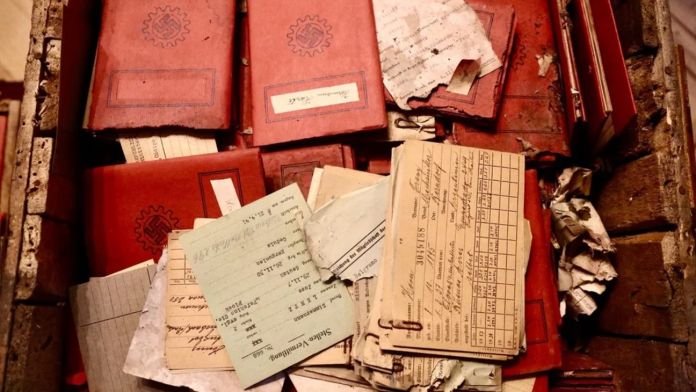Argentina’s Supreme Court uncovered a significant cache of Nazi-era materials in its basement, raising questions about the nation’s wartime neutrality. The discovery occurred during preparations for a new museum dedicated to the court’s historical documents. While organizing the archives, court staff stumbled upon several wooden crates containing items such as postcards, photographs, and thousands of notebooks from the National Socialist German Workers’ Party Organization Abroad and the German Trade Union. These materials were intended to disseminate Adolf Hitler’s ideology within Argentina during World War II.
The crates were part of a shipment of 83 packages sent in June 1941 by the German embassy in Tokyo aboard the Japanese steamship “Nan-a-Maru.” At that time, German diplomats claimed the boxes contained personal belongings. However, Argentine customs authorities, concerned that the contents could compromise the country’s neutrality, intercepted and seized the shipment. The matter was subsequently referred to the Supreme Court, where the materials remained stored and largely forgotten for over eight decades.
The recent rediscovery has prompted the Supreme Court to collaborate with the Buenos Aires Holocaust Museum to preserve and analyze the materials. Experts aim to examine the documents for insights into lesser-known aspects of the Holocaust, including Nazi financial networks abroad. This initiative underscores Argentina’s complex relationship with World War II, during which it maintained neutrality until 1944 and later became a refuge for numerous Jewish refugees fleeing Nazi persecution.
The findings also shed light on Argentina’s role as a haven for Nazi officials post-war. Notably, Adolf Eichmann, a principal architect of the Holocaust, and Josef Mengele, infamous for his medical experiments, both found refuge in Argentina. Eichmann was captured in 1960 and subsequently tried and executed in Israel. Mengele’s presence in Argentina highlights the nation’s complex history during and after the war.
This discovery has reignited discussions about Argentina’s wartime stance and its post-war actions. The Supreme Court’s decision to investigate and preserve these materials reflects a commitment to confronting and understanding this challenging chapter of history. By collaborating with institutions like the Buenos Aires Holocaust Museum, Argentina aims to ensure that the lessons of the past are not forgotten and that the full extent of Nazi influence in the region is comprehensively documented.












Wow, crazy find in Argentinas Supreme Court basement! What other secrets could be lurking down there? Time to explore!
Wow, crazy finding in Argentinas Supreme Court basement! Makes you wonder what other secrets are hidden away. What do you think?
Wow, shocking find in Argentinas Supreme Court basement! What other hidden historical treasures could be lurking down there? Mind-blowing!
Wow, can you believe what they found in Argentinas Supreme Court basement? Crazy to think about the history hiding in plain sight.